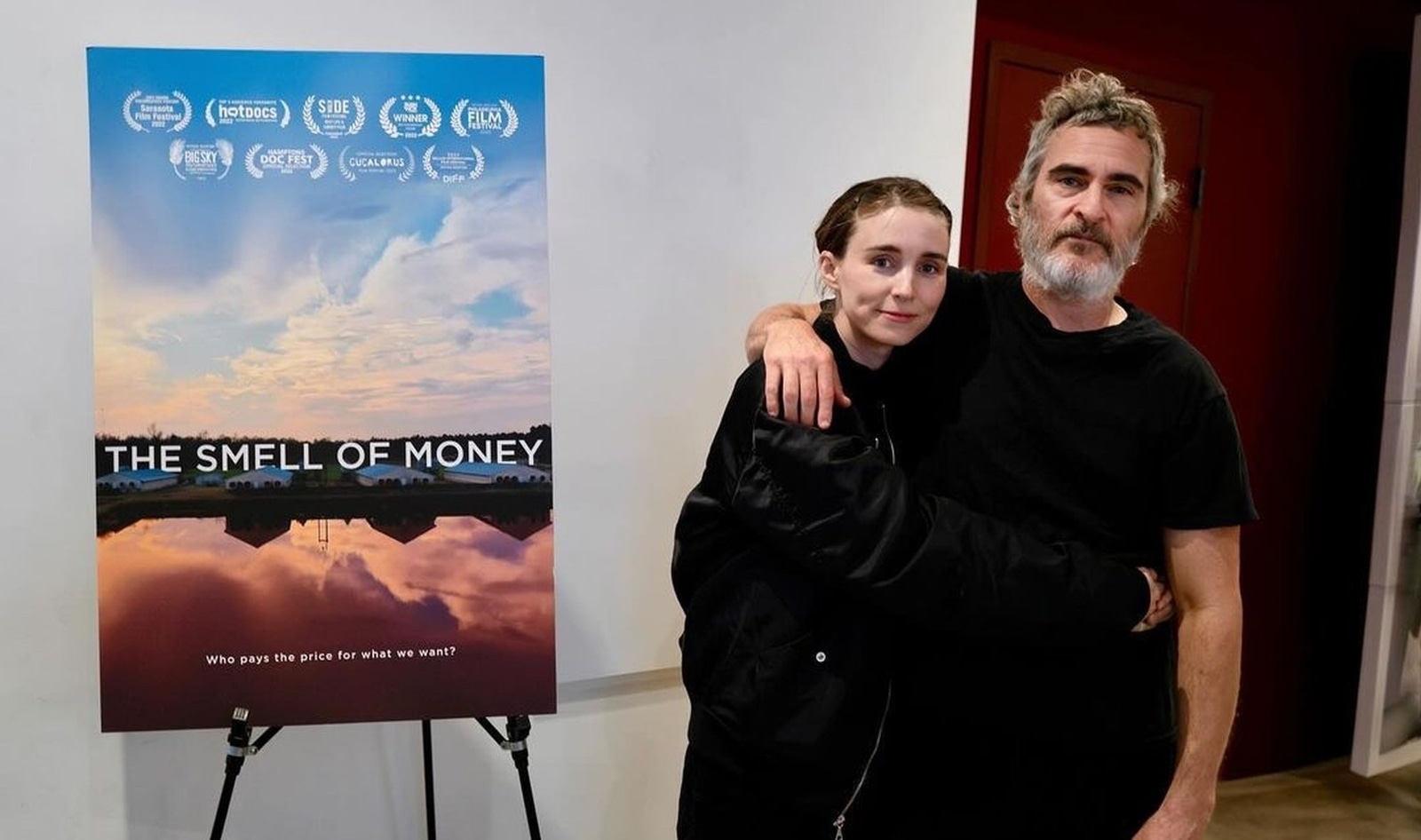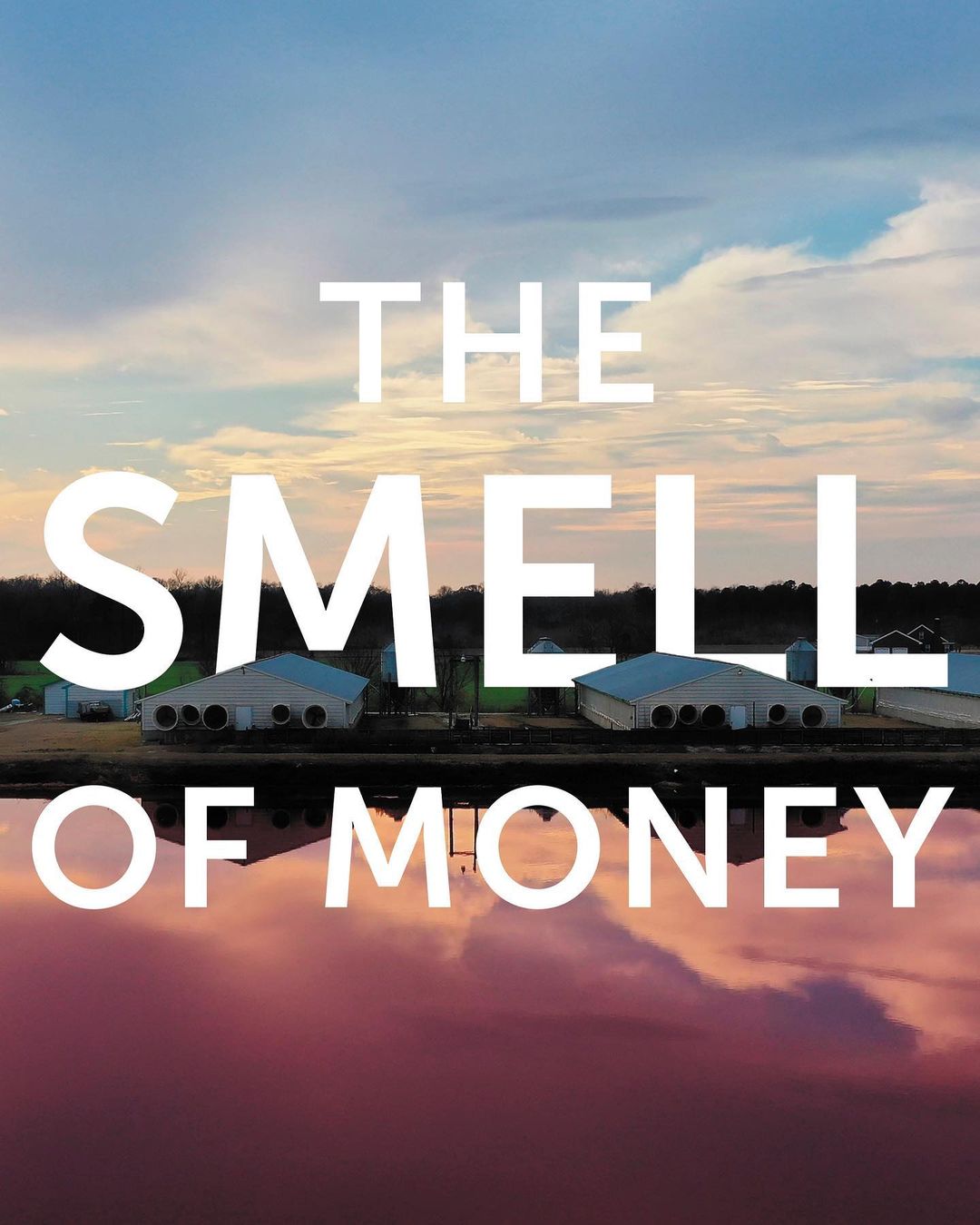
“A beautiful sunny day, and all of a sudden, you’re starting to feel droplets coming down,” says Elsie Herring in the new documentary The Smell of Money. Herring is a resident of Duplin County, NC, and the droplets she’s referring to are not rain, but hog waste.
North Carolina is one of the top pork producers in the US, but its factory farms are, quite literally, suffocating surrounding communities. According to the documentary, it is one of the only states in the US where it is legal for factory farms to spray untreated hog waste into the air.
“It stinks. It’s forced on us,” continues Herring, who is one of the central figures of The Smell of Money, which is directed by Shawn Bannon, produced by Jamie Berger, executive produced by Kate Mara, and supported by Rooney Mara and Joaquin Phoenix. “It burns your nostrils, makes your eyes water, and you start slobbering and your nose starts running,” Herring adds.
 The Smell of Money
The Smell of Money
The film explores the legal battle between Herring’s community and Smithfield Foods, one of the largest pork companies in the US. Its central theme is environmental racism; most of the people who live in Duplin County are people of color, and many families have lived in the region since the end of slavery. For them, the pollution is more than just disgusting—it’s deadly.
In 2021, one study evaluated the impact of farm pollution in states like North Carolina and concluded that it contributes to nearly 18,000 deaths a year in the US. Most of that is due to ammonia, which builds up in the air from the huge amounts of pig waste in the area. According to The Smell of Money, more than 10 million pigs are crowded into concentrated animal feeding operations (CAFOs) in North Carolina, and together, they create around 10 billion gallons of waste.
In high amounts, ammonia (a colorless gas) can irritate or burn the skin and even “damage the lungs or cause death,” reports the Centers for Disease Control.
Joaquin Phoenix: ‘Please talk about the film’
Alongside Rooney, Phoenix recently attended a screening of the documentary in Los Angeles, where he urged people to spread the word about The Smell of Money and its message.
“Please talk about the film,” he says in a clip posted to X by the fan account @jphoenixupdates. “Talk to your friends and family. I don’t know anything about social media, whatever that is, do that. Please talk about the film.”
The Smell of Money was released in 2022; it’s now screening in theaters across the US and Canada, and will likely be available to stream soon, too. “Movies like this, I think you know, kind of live or die based on word of mouth,” said Phoenix, who, despite being an Academy Award-winning actor, regularly devotes his time to activism.
Together with fiancée Rooney, he also produced The End of Medicine—a documentary that aims to raise awareness of the link between factory farming and existential health threats, including zoonotic disease and antibiotic resistance.
 The Smell of Money
The Smell of Money
Travon Free, another executive producer on The Smell of Money, also desperately wants people to talk about and understand what’s going on in North Carolina. Speaking with the Guardian recently, he said, “This is one of those things that’s very easily fixable if people just pay attention. That was why it was so enraging to see the film for the first time. It’s not complicated.”
The problem, he says, is that the issue is so easy to ignore. Smithfield Foods’ products line grocery store shelves all over the US, but research suggests that most of the consumers who buy them don’t know what it took to get them there. In fact, one survey commissioned by NGO Madre Brava earlier this year revealed that more than 90 percent of Americans know “very little or nothing at all about industrial meat production.”
“It’s not in your face,” said Free. “It’s not in the news. It’s not being thrust at you in any meaningful way all the time. It’s easy to ignore it. Black people suffer from environmental injustice all over this country, right?”
“It only matters to who it matters to,” he continues. “It’s a microcosm of what we experience at a macro level with things like climate change. It’s also a fault of the human condition. You only care about what’s causing you immediate pain, most of the time.”
Find out more about The Smell of Money, and when it’s screening near you, here.
This content was originally published here.








